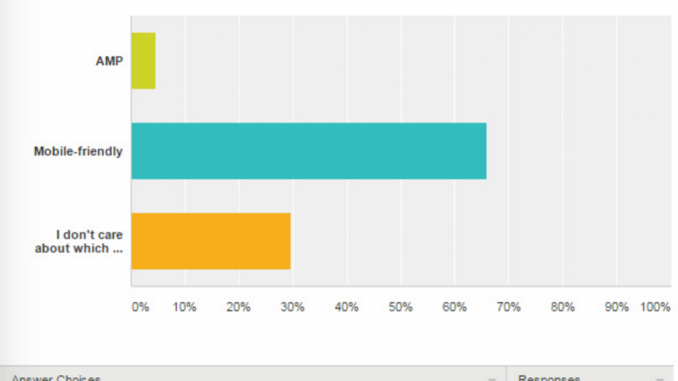
Last week, Google announced that Accelerated Mobile Pages (AMP) are making their way into the organic mobile SERPs.
While AMP is not a ranking signal, at least not yet, this announcement is a milestone for the initiative that Google launched earlier this year in an effort to speed the mobile web.
The search giant’s desire to make mobile web pages load faster is obvious: slow, clunky pages that don’t provide a good user experience threaten Google’s mobile ad business. AMP, which is an open standard that consists of slimmed-down HTML and JavaScript, aims to make it possible for publishers to more easily create performant mobile experiences.
But for all of AMP’s virtues, websites that have adopted AMP may not be benefiting from the introduction of their AMP pages into Google’s organic mobile search results. In fact, they could be seeing less traffic.
As Barry Schwartz of Search Engine Roundtable detailed, he’s seen a lower CTR from AMP pages. Glenn Gabe of G-Squared Interactive speculates that lower CTRs for AMP results could be due to the fact that users don’t know what AMP is, making the AMP icon and text that appears alongside AMP results a CTR killer:
Looking back the demo and seeing both AMP icons + mobile-friendly tags, I couldn’t help but think that the average user might understand mobile-friendly way more than AMP with a lightning bolt. And if that’s the case, wouldn’t that yield mediocre results for amplified pages in the search results (at least in the short-term)? And couldn’t that possibly lead to even more click through to mobile-friendly pages versus amplified pages?
In an effort to test his hypothesis, Gabe created a quick poll that asked respondents if they knew what AMP referred to, and whether they’re be more likely to click on an “AMP” or “mobile-friendly” search result. Not so surprisingly, only three of the 44 people who responded to the poll knew what AMP was, and only two indicated they’d be more likely to click on an “AMP” result compared to 29 who preferred “mobile-friendly.”
While a poll of 44 people is far from scientific, Gabe’s logic – that average consumers who aren’t involved with web development and SEO aren’t likely to know what AMP is – seems sound and raises questions about how Google will educate the public about what AMP is and what benefits it offers.
The good news is that Google is almost certainly collecting data about its new AMP results and is likely to take action if it notices lower CTRs across the board for these results.
In the meantime, early AMP adopters experiencing lower CTRs have a not so pleasant reminder that being an early adopter can sometimes be a double-edged sword.
Source: ClickZ
Link: As Google AMP enters the mobile SERPs, some see lower CTRs



Leave a Reply